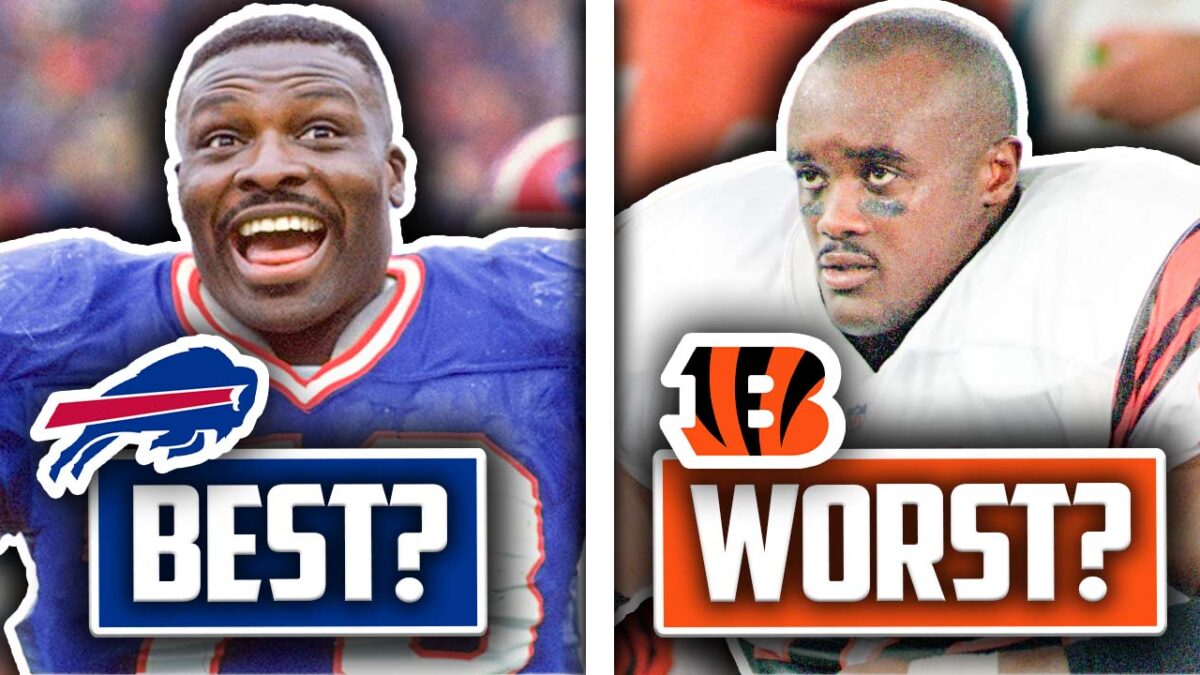
Another month has gone by this year, and we are now officially in April. What does April mean for the NFL draft world, though? It means draft season is finally here with the prestigious event on the 25th this year. It’s an exciting time in the NFL as fans wait to see who their team will take.
For one set of fans, however, they don’t need to ponder for weeks about who their team will ultimately be drafting. It’s just going to be a long couple of weeks, though. For Chicago Bears fans, before the Bears take the star-studded quarterback Caleb Williams out of USC. With the rights to the first overall pick and a trade that sent starting quarterback Justin Fields to Pittsburgh, it’s a no-brainer who will be going first.
Now, with all that being said, let’s jump into the 5 Worst 1st Overall NFL Draft Picks That Teams Regret and the 5 best of all time.
Which number-one overall NFL draft picks were stars, and were not?
#5 Worst: Ki-Jana Carter; Running Back
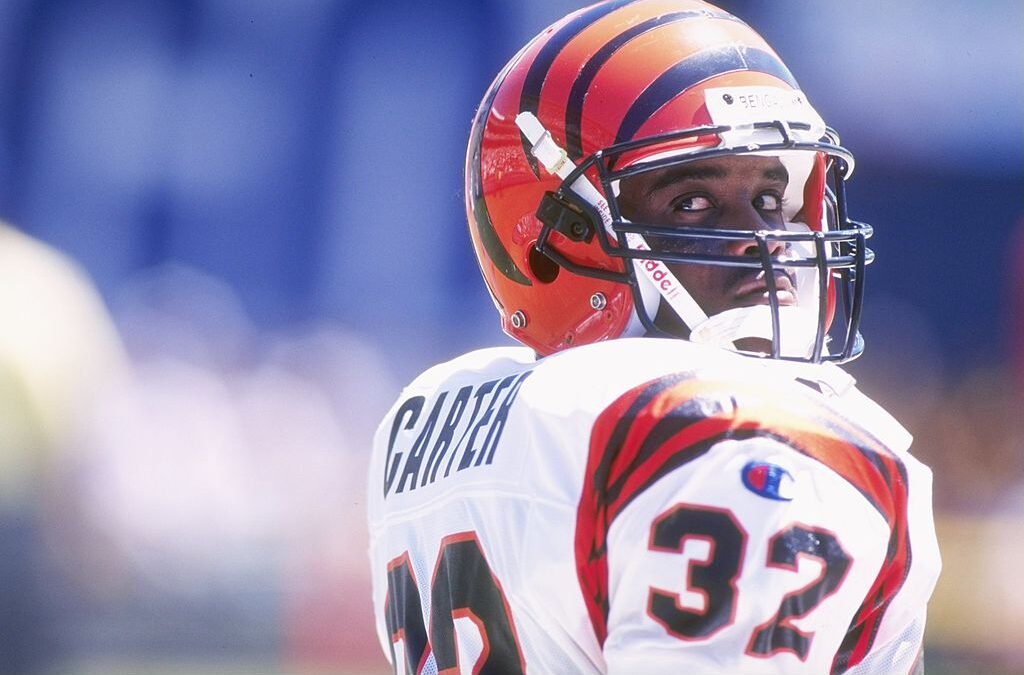
In the 1994 and 1995 drafts, the Cincinnati Bengals would hold the rights to the first overall pick, and twice in a row, they would get the pick wrong. But it would be Carter who ended up as the worst of the two picks.
In the 1994 NFL draft, Cincinnati selected defensive tackle Dan Wilkinson with the first overall pick, and hall-of-fame running back Marshall Faulk was be taken directly after. Wilkinson wouldn’t have an awful rookie year, but he didn’t prove to anyone why he was the first overall pick. Wilkinson would finish his rookie year with forty-four tackles and five and a half sacks while playing all sixteen games.
The Bengals would finish the season with a horrendous record of 3-13, but they wouldn’t hold the rights to the first overall pick. That was until they traded their number five overall pick and their number thirty-six overall pick, to the Carolina Panthers in exchange for the first overall pick.
Click on ‘Follow Us’ and get notified of the most viral NFL stories via Google! Follow Us
Cincinnati had messed up the year before by not taking the offensive rookie of the year, Marshall Faulk, so they looked to fix their mistake and get the right guy this time around. To fix their mistake, the Bengals would take running back Ki-Jana (Kenneth) Carter first overall in the 1995 NFL draft. It finally looked like the Bengals had gotten the right guy this time around, and surely it wouldn’t go wrong twice in a row, right?
Well, it did, Carter would tear his ACL in the Bengals’ first preseason game. He would miss his entire rookie season and return the next year. Carter would play the next two seasons, racking up 728 rushing yards and fifteen touchdowns.
Bad things come in threes, however, and he’d miss the 1998 season due to a broken wrist and the 1999 season due to a dislocated kneecap. Carter would be out of Cincinnati after the 1999 season, but he wouldn’t play the next year. He would then play a year for Washington in 2001 and two years in New Orleans in 2003 and 2004. He’d be out of the league after 2004 at thirty-one.
An extremely sad story would end Carter up with the unfortunate term of a first overall draft bust.
#5 Best: Troy Aikman; Quarterback
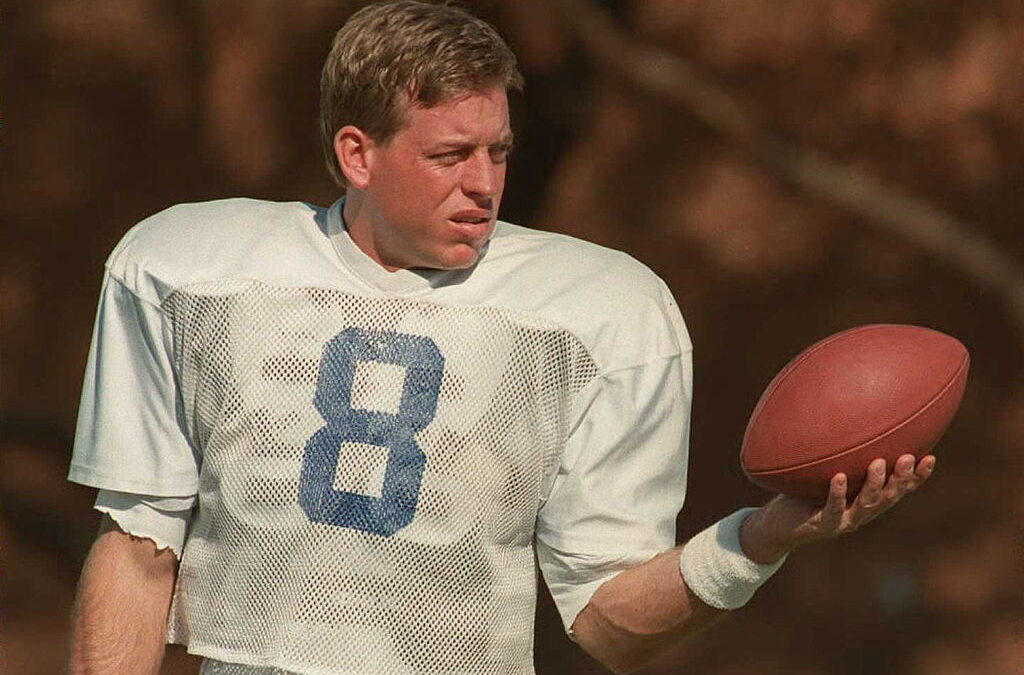
Troy Aikman would be taken first overall out of Oklahoma in the 1989 NFL draft by the Dallas Cowboys. In all honesty, Aikman wasn’t very good, but hey, he won three Super Bowls for Dallas, so he had to be doing something right.
Aikman’s rookie year would be horrid, as he won zero games in eleven starts. That year, he threw for 155 completions, 1749 yards, nine touchdowns, and eighteen interceptions. He had nothing going for him in his career except for his Super Bowls.
Aikman would play in three Super Bowls, winning them all in 1992, 1993, and 1995. He had a star-studded offense beside him with guys like Emmit Smith, Micheal Irvin, and Larry Allen, who are all hall-of-farmers.
Aikman would play twelve seasons for the Cowboys, retiring after the 2000 season. He would have had just six winning quarterback record seasons in his time there. Aikman was a first-ballot Hall of Famer and was inducted in 2006.
His final stats would be 2898 completions, 32,942 passing yards, 165 touchdown passes, and 141 interceptions. He also won a Super Bowl MVP and the Walter Payton Man of the Year award. Aikman wasn’t the best, but he led the Cowboys to three Super Bowl wins, and that alone makes him a hall of fame.
#4 Worst: Courtney Brown; Defensive End
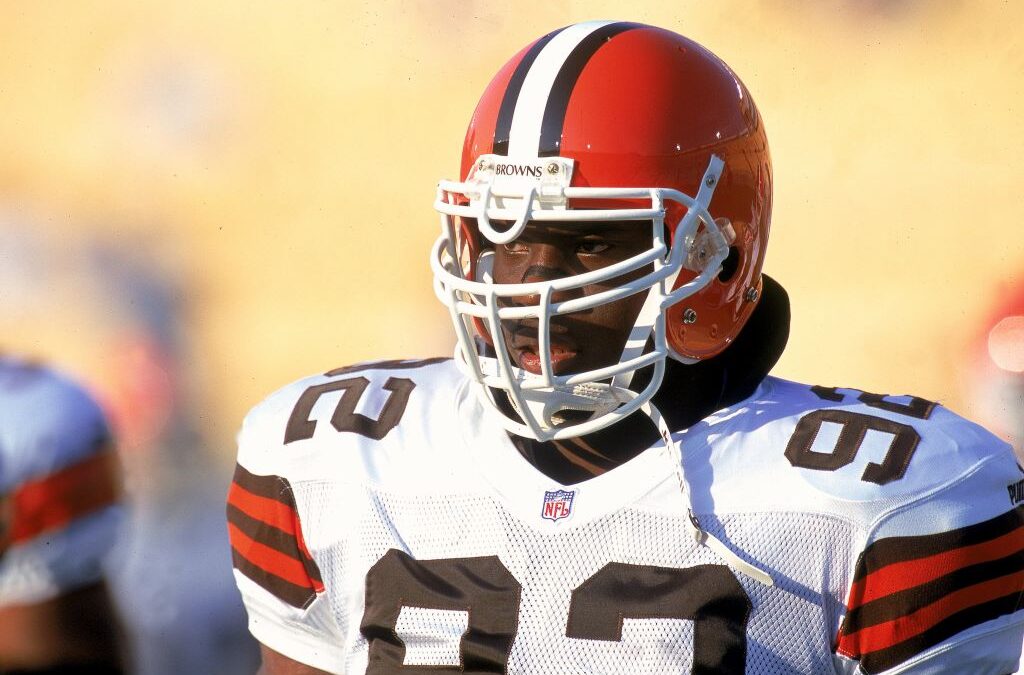
Defensive end Courtney Brown, out of Penn State, would be the first overall pick in the 2000 NFL draft to the Cleveland Browns. Hall of Fame linebacker Brian Urlacher would be taken eight picks after, at pick nine.
Brown wouldn’t have an awful rookie year, but it would be his longest and best season. The year after, in 2001, Brown suffered an ankle and knee injury that would sideline him for the rest of the season. Brown would only play in five games that year. Brown wouldn’t remain healthy at all for the rest of his career.
After his right knee injury that would require surgery in 2001, he’d come back the next year in 2002. This time, however, it would be Brown’s left knee. He played eleven games that year. Now he’d come in 2003 and tear his bicep, he’d play 13 games. In 2004 he suffered a right foot injury and another left knee injury; he played in two games.
After the 2004 season, he’d be out of Cleveland. In 2005, he joined the Denver Broncos and played in fourteen games. He suffered a left elbow injury in 2005 and a third left knee injury in 2006. He wouldn’t play in the 2006 NFL season.
In March of 2007, Brown would be cut by the Broncos after a failed physical. A once-promising young player in the NFL would have his career ruined by injury. Brown never played again; he was out of the league at just twenty-nine.
Brown would finish his career with six forced fumbles, eight fumble recoveries, nineteen sacks, 196 total tackles, and one defensive touchdown.
#4 Best: Bruce Smith; Defensive End
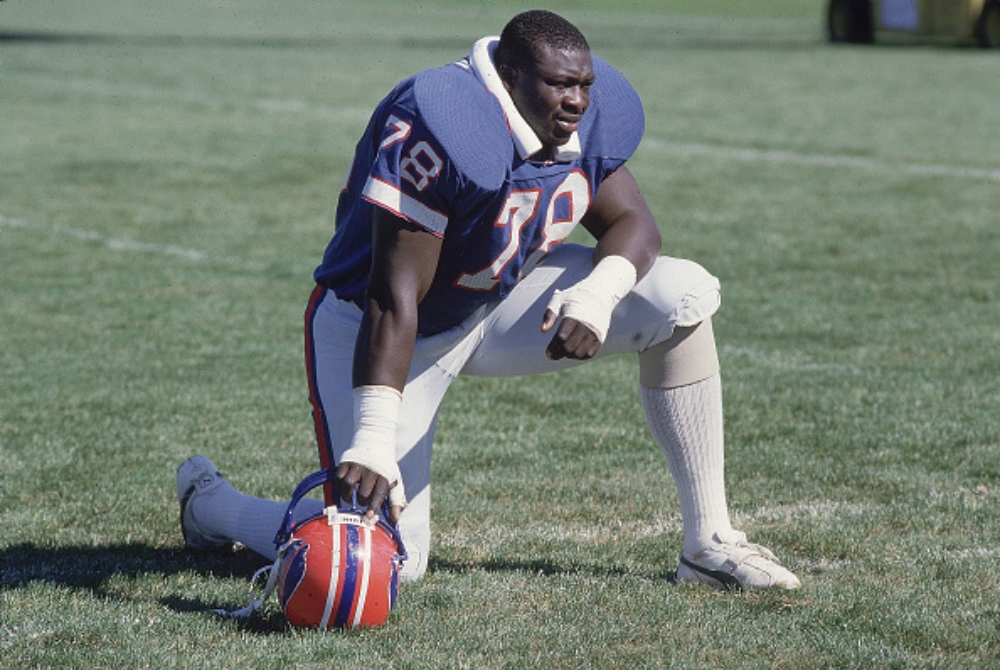
After a dreadful season in 1984, where they would finish 2-14, the Buffalo Bills would land themselves the first overall pick. They would use this pick to take the two-time all-American defensive end out of Virginia, Bruce Smith.
Smith would have an immediate impact in his rookie year with Buffalo and be awarded the AFC Defensive Rookie of the Year at season’s end. He’d finish his rookie year with forty-eight tackles, six and a half sacks, and four fumble recoveries. He also started thirteen games that year.
Smith would only get better from here, and in 1987, he’d earn his first of four AFC Defensive Player of the Year. He earned the others in 1988, 1990, and 1996. However, that wasn’t it for Smith, as he also won the NFL’s Defensive Player of the Year twice, first in 1990 and the other in 1996.
Unfortunately, there would be no Super Bowl rings for the defensive unit. He would reach the game four times in a row from 1991 to 1994, the Bills losing them all. Smith was a key factor in getting his team there, but unfortunately, they could never get the win Smith deserved.
Smith would leave Buffalo in 1998 after fifteen years with the team at thirty-six. He’d join Washington and would play there for four years before retiring. Smith would retire at the age of forty after the 2003 season. Smith would play nineteen long years in the NFL, and his 200 career sacks are an NFL record.
Smith would finish with career stats of 1,224 total tackles, 200 sacks, forty-three forced fumbles, fifteen fumbles recoveries, two interceptions, two safeties, and one defensive touchdown. Smith would be a first-ballot Hall of Famer and would be inducted in 2009.
Also read: Ranking All The No. 1 Overall NFL Draft Picks Since 2000 From WORST To FIRST
#3 Worst: Aundray Bruce; Outside Linebacker
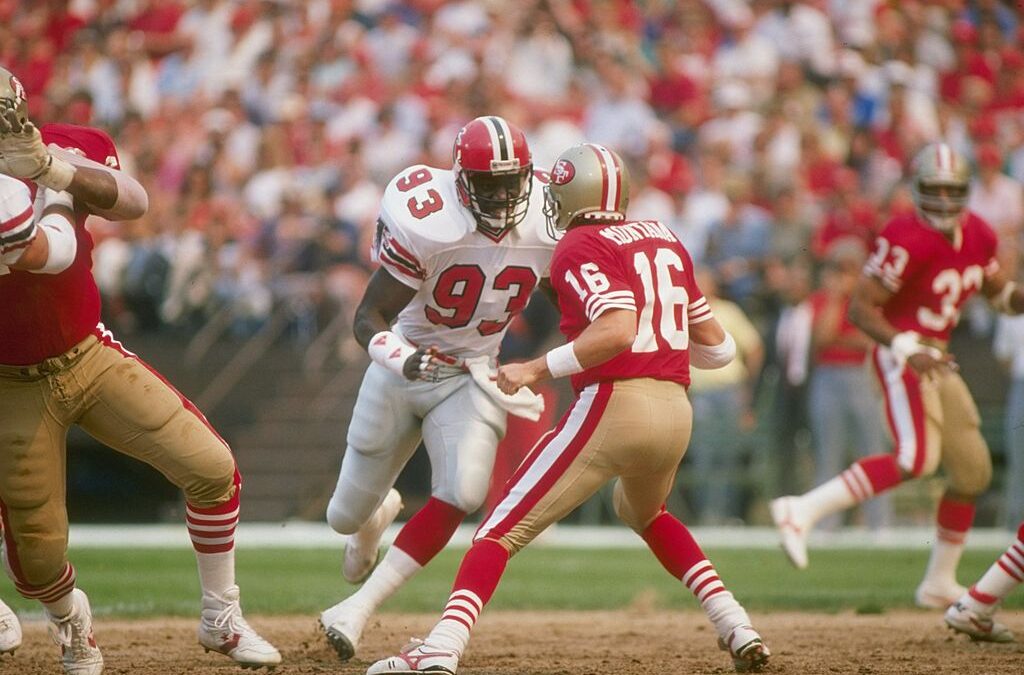
Bruce would be taken first in the 1988 draft out of Auburn to the Atlanta Falcons. Despite having an eleven-year career, Bruce just wasn’t good. His rookie year would be his best year.
During Bruce’s rookie season, he would have two interceptions, two forced fumbles, six sacks, and seventy total tackles. He wouldn’t get any better after this year and regressed for the rest of his career. Bruce was a stud at Auburn but couldn’t grasp the complexities of the NFL. Bruce often struggled to learn the playbook and execute the plays.
He would be out of Atlanta after the 1991 season, and he spent four years there. Bruce would sign with the then-Los Angeles Raiders, where he remained for the rest of his career. Maybe a change of scenery would make him that player he was at Auburn? It didn’t; he just continued to regress. Bruce wouldn’t start in more than forty games in his 151-game career. He only started three games as a Los Angeles/Oakland Raider.
Bruce’s career would end after the 1998 season where he only played one game. After four years with the Falcons and seven years with the Raiders, the once-first-overall pick was out of the league.
#3 Best: Terry Bradshaw; Quarterback
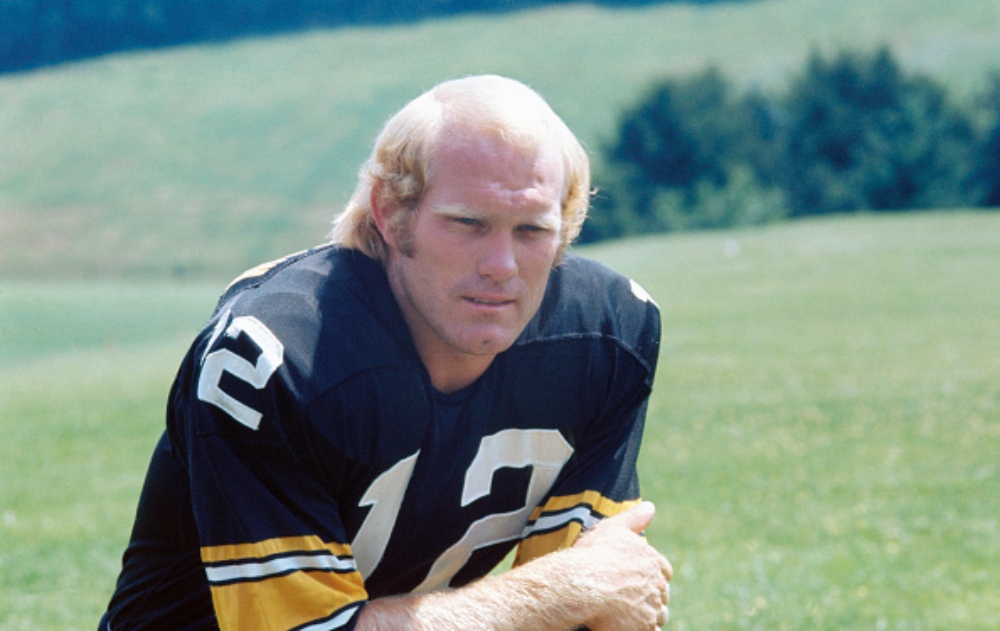
Terry Bradshaw would be taken first after a coin flip between the Bears and the Steelers to determine the first overall pick. Bradshaw was drafted out of Louisiana Tech in the 1970 NFL draft.
Bradshaw played in an old era of NFL football, and his stats don’t look the best, but he would win four Super Bowls for the Steelers. Those Super Bowls are what made Terry an NFL legend.
Bradshaw would play fourteen years for the Steelers, where he would have a hall-of-fame career. In those years, he got to play in four Super Bowls and all of them. He retired after the 1983 season.
He would finish with stats of 2025 completions, 27989 passing yards, 212 passing touchdowns, 210 interceptions, and a 107-51 record. Bradshaw also won two Superbowl MVPS and one MVP. He was a first-ballot hall of famer, being inducted in 1989. He didn’t have the greatest career stat-wise, but he still won four Super Bowls, which made him a legend.
#2 Worst: Tim Couch; Quarterback
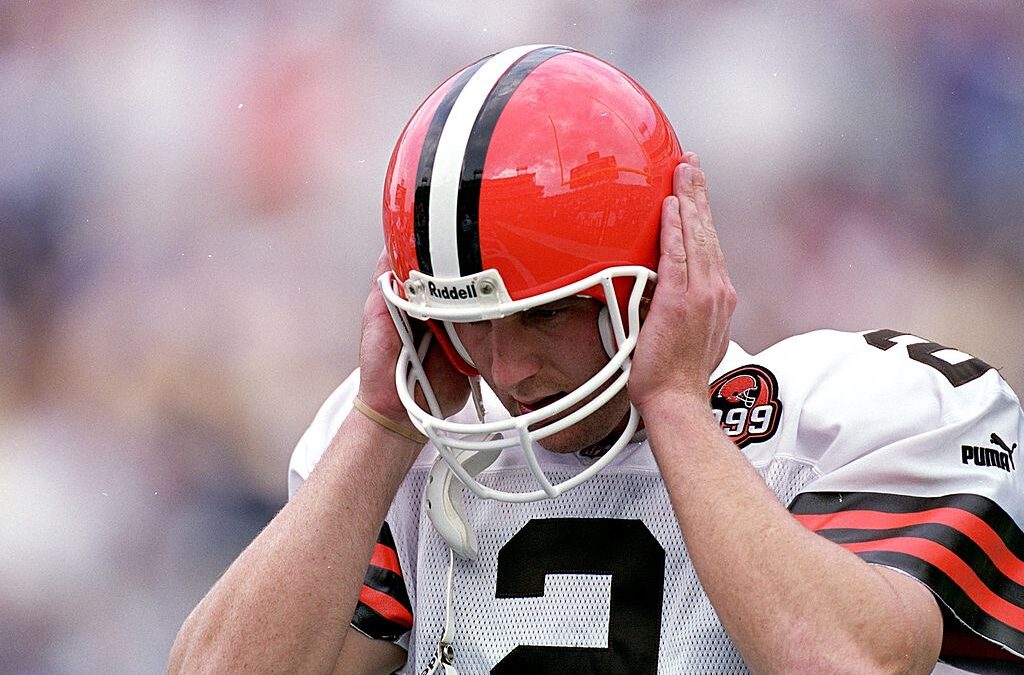
Couch would be taken first overall out of Kentucky in the 1999 NFL draft to the new Cleveland Browns. A few years earlier, the Browns were relocated to Baltimore, where they became the Ravens. The NFL would expand, and they were back to start the 1999 season.
Couch was drafted into a horrendous situation in Cleveland, but it still doesn’t excuse him from being as awful as he was. There’s not much to say about Couch other than just how bad he was. He would start in fourteen games in his rookie year and win just two. He’d also only throw for just 2447 yards.
Couch suffered a thumb injury in his next season and only started in seven games. He still would only win two games. He would throw for 1483 yards, seven touchdowns, and nine interceptions. His third year would be his best season, throwing for over 3000 yards, but he still had a losing record of 7-9. He would fracture his right tibia the next season and fans would cheer as he was carted off. He started in fourteen games, finally having a winning record of 8-6.
Next year in 2003 would be his last. That year Couch would deal with tendonitis in his throwing elbow and only start eight games, winning three. Couch was cut after the season and was out of the league at just twenty-six.
#2 Best: John Elway; Quarterback
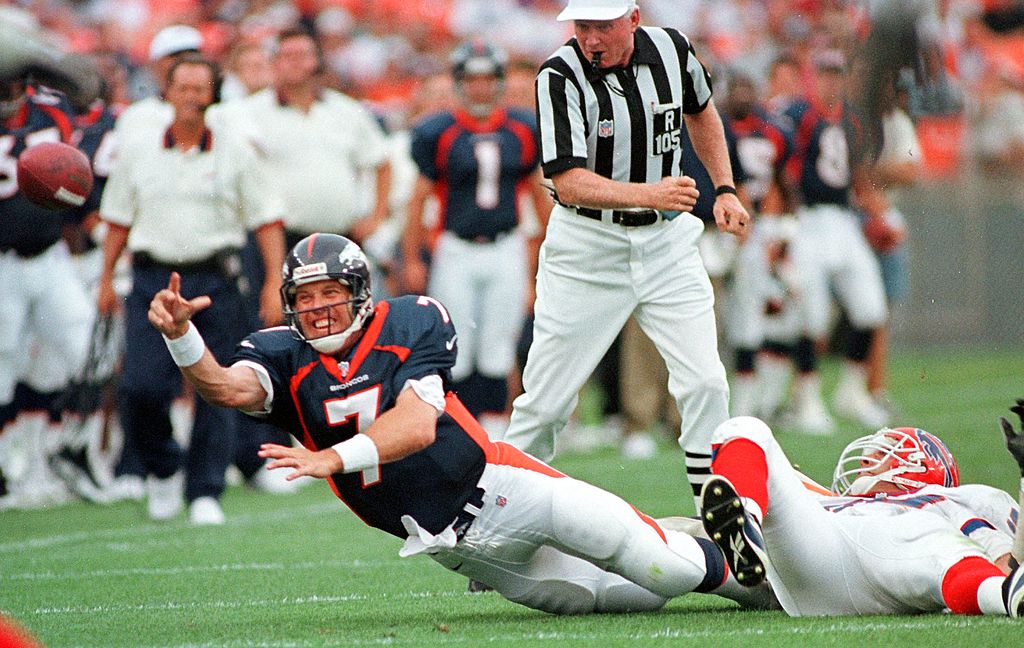
Elway would be taken first overall out of Stanford to the then-Baltimore Colts. Before the draft. Elways had informed the Colts that he wouldn’t play for the franchise if they selected him. The Colts selected him anyway after they failed to trade the first overall pick.
Elway stuck to his word and refused to play for them. Just days after the draft on May 2, the Colts would trade Elway to the Denver Broncos. Elway would go on to play for the Broncos for sixteen years and have a hall-of-fame career. However, Elway’s career would not start hot at all.
Ten games is all Elway would start in his rookie season. In his ten games, Elway would throw for just 1223 yards and seven touchdowns; he would have fourteen interceptions and win only four games. Despite being limited to just ten games, Elway’s stats were still awful, and he did not look worthy of first overall.
He’d turn it around fast, however, and for the next year, he’d have a twelve-game win season. In the next two seasons, he’d have eleven game-win seasons. After those years, Elway would now enter year five in 1987 as the Broncos quarterback. That year, Elway would win MVP and play in the Super Bowl, unfortunately losing to the Giants.
Elway wouldn’t stop there and would play in four more Super Bowls, winning two back-to-back games in 1997 and 1998. Elway would retire after his Superbowl win in 1998 after a long, successful career with Denver.
His final stats were 4123 completions, 51,475 passing yards, 300 passing touchdowns, and 226 interceptions. Elway would also win an MVP, a Super Bowl MVP, and the Walter Payton Man of the Year award. He was a first-ballot Hall of Famer, being inducted in 2004. Elway would also serve as the Broncos general manager from 2011-2020. He would appear in two Super Bowls, winning one during his tenure as the Broncos general manager.
Also read: 2024 NFL First-Round Mock Draft For All 32 Picks: 10.0 (With Trades)
#1 Worst: JaMarcus Russell; Quarterback
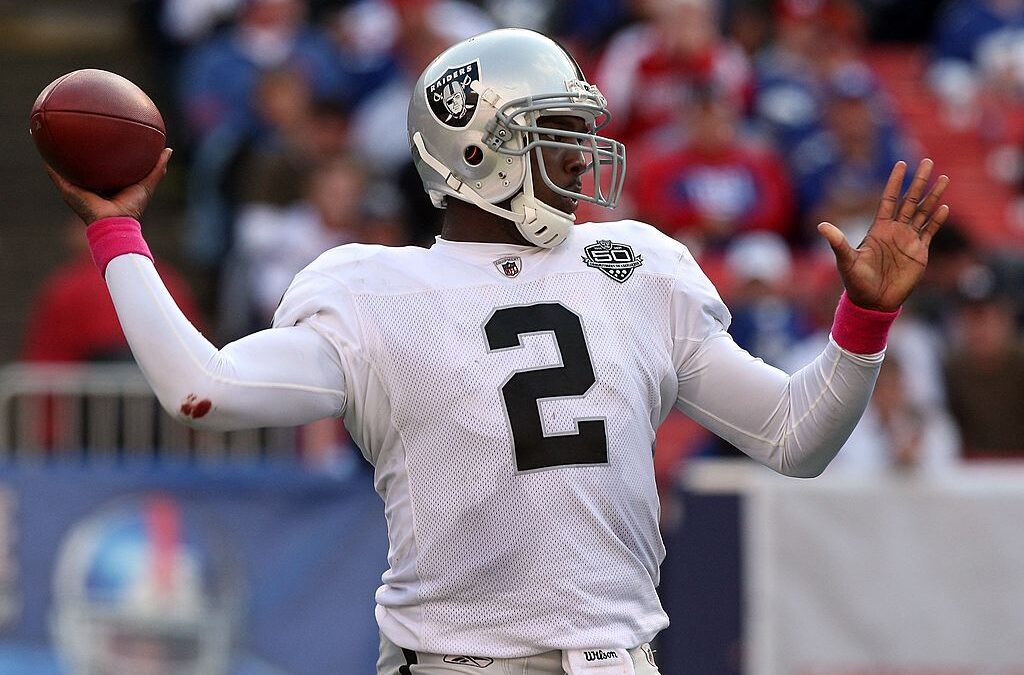
The biggest bust of all time, JaMarcus Russell would be taken first overall out of LSU in the 2007 NFL draft by the Oakland Raiders. To no one’s surprise, he is number one on this list. The Raiders are notorious for their awful drafting, but this was the worst.
Russell was atrocious and lazy and was out of the league in 2009 after three years. Russell entered the league at six foot six 260 lbs and left at almost 300, he also admitted to having a codeine addiction. Russell’s defining moment of his career would be when he was given a blank DVD by the Raiders, who told him it was a film. Russell had told the Raiders he watched it and was on board. This just proved to the Raiders how badly they messed up.
Russell’s career stats would be 354 completions, 4083 passing yards, eighteen passing touchdowns, twenty-three interceptions, and a record of 7-18. He was so bad it wasn’t even funny. Russell was cut after the 2009 season and never played again; he was just 24.
#1 Best: Peyton Manning; Quarterback
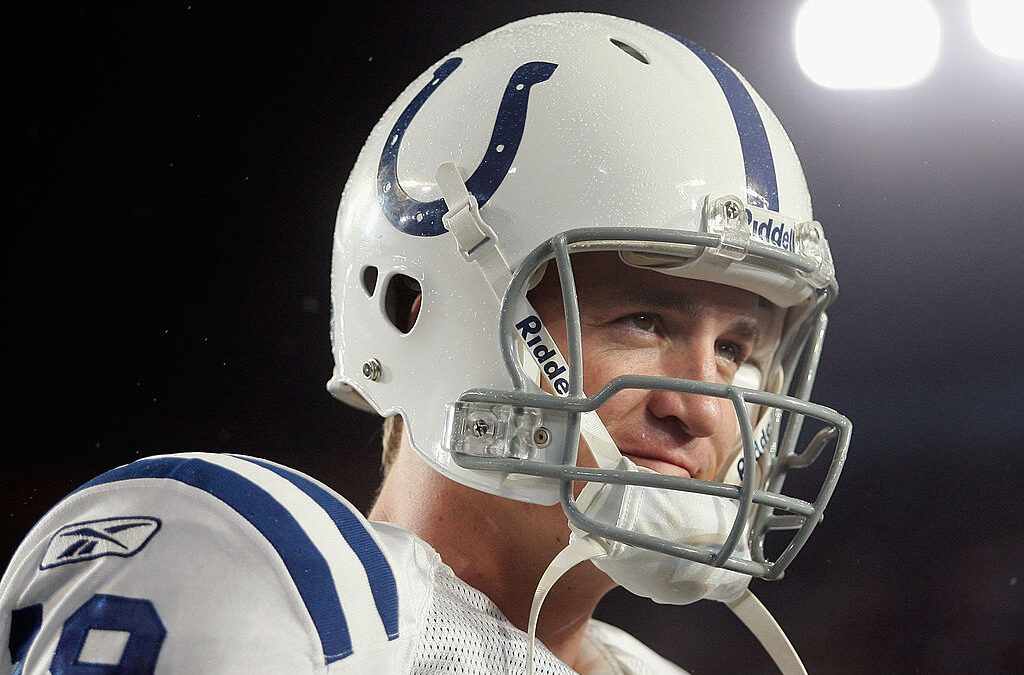
The son of former NFL quarterback Arch Manning, Peyton would be taken first overall out of Tennessee to the Indianapolis Colts. Peyton would have a shaky start to his career. In his rookie season, Peyton threw a rookie-record twenty-eight interceptions. He’d also finish with a record of just 3-13, not good for a first-overall pick.
He’d quickly turn it around, and next year, he led the Colts to a record of 13-3 while throwing for over 4000 yards. Four years after that, Peyton won his first of five MVPs. In 2004, the sheriff doubled down and won the Offensive Player of the Year and his second MVP.
After a scare from Devin Hester and the Bear’s defense, Peyton would lead the Colts to the win. The Colts would win Superbowl XLI 29-17. After a third MVP season, Peyton would be back at the Super Bowl two years later. Unfortunately for the sheriff, he’d lose, this time around 31-17, to the Saints. Peyton would have two more years and one more MVP in Indianapolis before a devastating neck injury.
In the offseason of 2011, Peyton would undergo surgery for a severe neck injury. He would miss the whole season. That year, the Colts would end up with the first overall pick. The Colts selected quarterback Andrew Luck, and Indianapolis cut Peyton. They had given up on the sheriff.
Peyton would sign with the Broncos in the offseason, and he played there for four years before retiring. In his years in Denver, Peyton would have his fifth MVP season and appear in two Super Bowls, winning one. He also set the NFL record for most passing yards and touchdowns in a season. Peyton’s final year would come in 2015 and he only played in nine games, winning seven, he would go on to win the Superbowl still.
The sheriff would finish his career with 6,125 completions, 71,940 passing yards, and 539 passing touchdowns. He also won five MVPs, the Walter Payton Man of the Year in 2005, a Superbowl MVP in 2007, and the Comeback of the Year in 2013. Peyton was a first-ballot Hall of Famer and was inducted in 2021.
Also read: The Most Surprising First-Round Picks Of The Last 10 NFL Drafts


